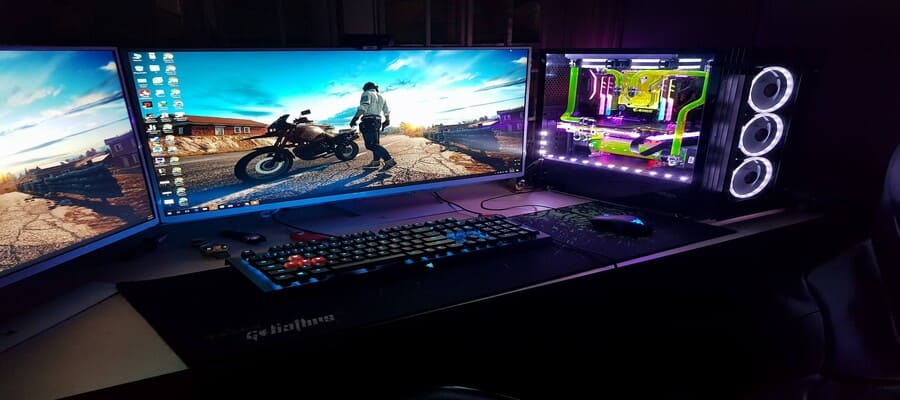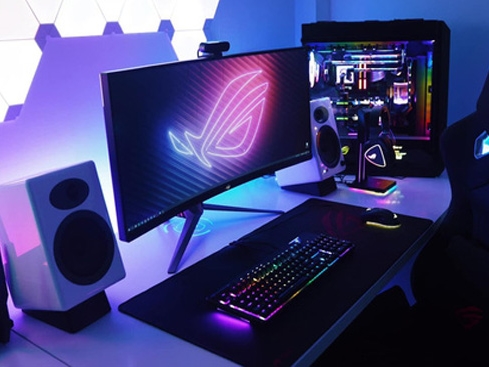What are the similarities and differences between gaming PC and graphics PC?
Compared to PCs for normal tasks, gaming PCs and graphics PCs are two lines of computers with higher configurations. However, these two lines of computers serve two different usage needs, so there are many differences in structure, CPU, RAM, motherboard. Let's find out with TipsMake what are the similarities and differences between gaming PCs and graphics PCs through the following article.
1. The need to use PC Gaming and PC graphics
- PC Gaming is a type of computer specialized for gaming, very popular with gamers or streamers. This type of computer compared to office computers will have a stronger configuration, specially designed to meet the needs of 'gaming' users. Nowadays, computer games are getting higher and higher quality, so PC gaming is increasingly developed to meet the needs of smooth gaming.

- Graphics PC is a type of computer that specializes in graphics processing, with high configuration to handle professional tasks such as movies, engineering, video, audio. The most common feature of these computers is the powerful CPU and especially the graphics card is much more powerful than normal computers.
2. What are the similarities and differences between PC Gaming and PC graphics?
2.1. Comparison of CPUs of Gaming PCs and Graphics PCs
Gaming PCs compared to graphics PCs usually need more cores/threads to handle tasks in games. Currently, a gaming computer is usually integrated with a CPU with 4 cores, but the best is a CPU with 10 cores/20 threads to be able to handle all games.
Meanwhile, a graphics PC requires more cores/threads to multitask multiple tasks and manage multiple users at the same time. Therefore, the perfect CPU for a graphics machine is around 64 cores/128 threads.
However, the maximum clock speed of the two types of computers is the opposite of their number of cores/threads. The graphics PC reaches a maximum boost clock speed of about 4.3 GHz while the gaming PC reaches up to 5.3 GHz.

2.2. Comparison of PC Gaming and PC Graphics Motherboards
Because there are differences in the components of a graphics PC and a gaming PC, the motherboards of these two PC lines are not the same. The motherboard of a graphics PC will be larger than that of a gaming PC, and it is also more elaborately designed.
2.3. RAM for Gaming PC and Graphics PC
Graphics PCs will require more RAM than gaming PCs. Gaming PCs today have 8GB-16GB of RAM, while graphics PCs can have up to 16GB or more. In particular, high-end models can reach up to 128GB.
Additionally, graphics PCs often use another type of RAM to prevent data errors, also known as ECC. However, it is not necessary in gaming computers and is quite expensive compared to regular RAM.
2.4. Comparison of GPUs of gaming PCs and graphics PCs
GPU, also known as graphics card, is a typical component that makes the difference between a graphics PC and a gaming PC and other types of computers. This type of component supports graphics processing and specific calculations related to design. And of course, it will be fine-tuned to be compatible with many specialized design software today.

As for PC gaming, there is no need to require more than a discrete graphics card. This component in PC gaming will be fine-tuned to be compatible with games, not focusing on design and specialized design software.
In summary, the similarities and differences between gaming PCs and graphics PCs include:
- Both gaming PCs and graphics PCs have higher configurations than other regular office computers.
- Graphics PCs require CPUs with more cores/threads but achieve lower clock speeds than gaming PCs.
- Graphics PC requires better RAM & Graphics Card than gaming PC.
- Graphics PCs have larger motherboards than gaming PCs.
Above are the similarities and differences between gaming PCs and graphics PCs that TipsMake shares. Hopefully, based on this comparison, you will have a more accurate view of these two popular computer lines and have the right choice to meet your different needs and purposes.